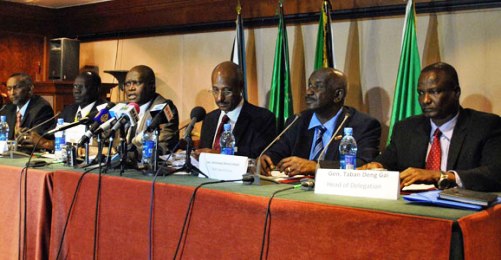Khartoum critical of IGAD’s approach in South Sudan negotiations
April 15, 2014 (KHARTOUM) – The Sudanese government has sharply criticised the role of the regional block, the Intergovernmental Authority of Development (IGAD), in the ongoing conflict in South Sudan, warning of the gravity of the situation in the newborn state.

The state’s minister at the Sudanese foreign ministry, Kamal Al-Din Saeed, in a statement before the parliament on Tuesday, described IGAD’s approach to negotiations between the warring parties in South Sudan as “traditional” and doesn’t take into consideration the special nature of the country, affirming it will fail to resolve the crisis.
“The crisis in Juba will not be resolved on the basis of the balance of powers or political equations,” Saeel said. He further stressed that that IGAD must adopt different approach in dealing with the crisis in South Sudan.
The minister asserted that Khartoum is well placed to make proposals which accommodate the nature of the conflict in the newborn state, saying they suggest a comprehensive solution with the participation of all parties and the civil society.
WESTERN PROPOSITIONS
The Sudanese official revealed Western attempts to impose a proposal of forming a transitional government in Juba without the participation of Kiir and Machar to run the country in the coming period before to hold general elections.
“The West doesn’t have a ready solution. It seeks to impose this proposal if it finds a suitable person to lead the transitional government and the appropriate manner to make him acceptable to all the parties,” he added.
The two conflicting SPLM factions signed a ceasefire agreement in 23 January. However, the fighting continues on the ground, as the both sides accuse each other of violating the terms of the deal.
The warring parties are due to resume talks in Addis Ababa on 22 April, without the participation of the seven former political detainees.
The move followed threats by South Sudan to boycott talks if the group of seven were allowed to take part. It was also reported that the rebels accepted to negotiate without them.
RENAISSANCE DAM INITIATIVE
In a separate issue the minister announced Sudan will launch an initiative to converge views of Egypt and Ethiopia on the issue of the Grand Ethiopian Renaissance Dam (GERD) project.
He stressed that Khartoum is making arrangements to host a joint meeting between Cairo and Addis Ababa at the political and technical levels to discuss the issue, denying that Sudan is taking the side of Ethiopia in this dispute.
Egypt fears that the $4.6 billion hydropower plant will diminish its share of the river’s water flows, arguing its historic water rights must be maintained.
Ethiopia is the source of about 85% of the Nile’s water, mainly through rainfall in its highlands, with over 90% of Egyptians relying on water from the Nile’s flows.
(ST)
